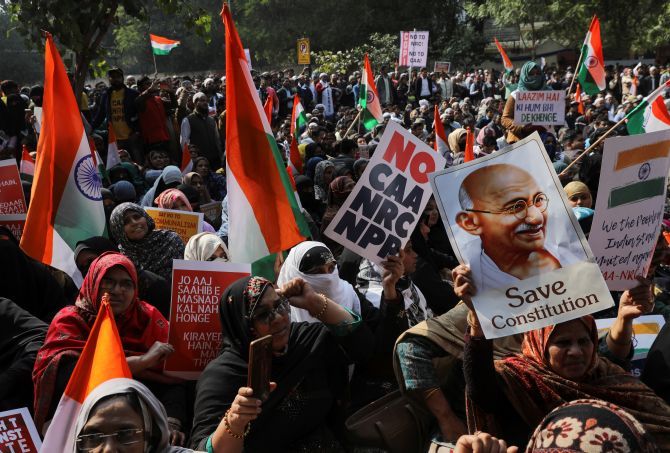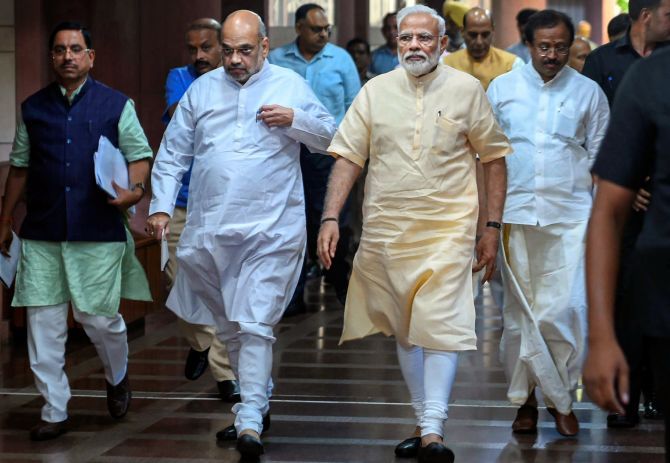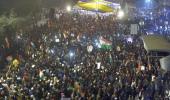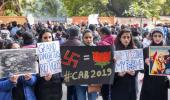'The people of India have not only challenged the ruling dispensation with the Constitution, they have also opened the eyes of the leadership that sits in the Opposition.'

Rahul Mukherji has previously taught at the National University of Singapore, Jawaharlal Nehru University in New Delhi, Hunter College - City University of New York and the University of Vermont. His two most recent books include Globalization and Deregulation: Ideas, Interests and Institutional Change in India and The Oxford India Short Introduction to the Political Economy of Reforms in India.
"Was the Constitution, after all, not about We the People?", Professor Mukherji asks Aditi Phadnis.
Prime Minister Narendra Modi stormed back to power in 2019 -- despite poor economic performance, a badly managed slowdown and high unemployment -- on the back of nationalist appeal.
Is it all catching up with the Bharatiya Janata Party now?
Are street demonstrations on diverse issues a manifestation of economic discontentment?
Economic discontent is a background condition that is adding fuel to the fire of student movements and other spontaneous movements.
To JNU, Jamia, Aligarh, and various other university campuses have now been added the IITs and IIMs -- the issue of economic distress cannot be underestimated.
Onion and vegetable prices that have driven a surge in the consumer price index, joblessness, even the worry that banks may put a limit on withdrawal, is bringing Hindus and Muslims together on the platform of economic distress.
Prashant Kishore of the Janata Dal-United) was the first to point out that the National Register of Citizens will divide India on a class basis because of the transactions costs associated with the NRC.
After all, did not the Assam NRC leave a lot of Hindus out?
If the economy had been in a better shape, the protests could be muted. It is possible that Hindu-Muslim polarisation would have been even greater in that case.
To add fuel to fire, the government is behaving as if the dismal rate of growth, and the disgraceful unemployment and consumption statistics are not a matter of fact.
The prime minister and his colleagues pretend that all is well.
Often statistics are sought to be hidden from the public gaze.
But citizens must worry, when onion prices and joblessness are at an all-time high, the government is only withholding statistics and praising its own performance.
Many who voted the BJP now feel the pinch, be it construction work, delayed MGNREGS payments, or factory or corporate job losses.
It is noteworthy that 250 million Indians went on strike on January 8.
Many students who are now opposing the government would have also voted the BJP thinking that the prime minister would deliver on his long-standing promise: Sab ka saath, sab ka vikas.
The strategy of distracting citizens with Pulwama, Balakot, Citizenship (Amendment) Act and the NRC has begun to boomerang in the face of poor governance. The BJP is losing state-level elections when just a few months ago it seemed that the BJP would sweep the country.
At that time, Mr Modi went all the distance to bat with the idea that national and the state-level elections should be held at the same time.
Was India going to turn into a kind of 'hybrid democracy' like Bangladesh with no Opposition?
This optimism of the ruling party was somewhat overturned when it could not form the government in Maharashtra.
Maharashtra is an important state considering its size and wealth.
Soon thereafter, the BJP lost Jharkhand.
The fact that the BJP government was not working for forest rights of the tribal people did not help.
No one is complaining about electronic voting machines any more.
It seems voters in India are casting their ballot on clear economic issues in many states.
When we attempt to study 'the crowd' in the demonstrations going on all over India, we find there is little in common among it.
It is not the Navnirman movement; nor is it the Naxalbari uprising. There are young people from (relatively) wealthy families as well as the middle class and the poor.
There are Muslims protesting as well as Hindus.
How do you read it?
These current protests are neither like the Navnirman movement led by Jayaprakash Narayan nor the Maoist revolt in Naxalbari. What was common to all these movements was political leadership.
And, there were parties behind these movements.
In the case of the movement led by JP, his towering and uncompromising Gandhi-like presence was a pole star.
Today's women and youth are openly expressing themselves in favour of an alternative idea of inclusive India.
Muslim women in Shaheen Bagh, many of them housewives devoid of high academic credentials, could teach scholars a lesson or two in political representation.
They are saying that the Muslim in India is an Indian who will not tolerate the status of a second class citizen.
It is an affront to Indians if they have to produce special certificates to prove their identity under the threat of NRC.
Once upon a time the slogan was 'quit India today it is 'hum dekhenge! (we will see!) and 'kagojamra dekhabo na (paper, we shall not show!)'
The protests in Jamia and JNU have turned into nationwide campaigns. There are a number of causes to struggle for. If higher education can be free in Germany why not in India?
Who will take care of the poverty-stricken and talented youth who must contribute to the country's well-being?
Should academic institutions be autonomous or should they be ruled by a party-State reminiscent of ones in many former Communist and authoritarian regimes?
The manner in which recruitment, appointments and the fees in JNU were sought to be managed -- along with caricaturing it as an enemy of the nation -- it was clear that JNU was the target of the ruling dispensation.
If JNU is such an evil institution, then one must also acknowledge the two alumni in the Cabinet and numerous civil servants who run the country, apart from its profound contribution to the life of the intellect.
Not only is the current Nobel Prize winner an alumni, scholars in JNU have contributed to the way India has debated its problems, and some even hold chairs in the world's renowned universities.
The idea of India is much deeper than what political parties with anointed leaders can imagine.
For example, Swami Vivekananda, the patron saint of the Indian renaissance, contended that the Indian tradition was so inclusive that Hinduism was not just about toleration but assimilation as well.
His remarks at the Parliament of Religions in Chicago in 1893 was the boldest expression of the cosmopolitan view at that time.
He articulated the Vedantic ideal lived and experienced by his Master Sri Ramakrishna Paramahansa -- all paths no matter how contradictory they may appear -- all lead to the same goal.
The next generation that produced Gandhi, Tagore and Azad practised the cosmopolitan version of Hinduism and Islam.
The idea of living with, accepting and learning from diversity is an integral part of national identity that cannot easily be challenged.
It is the people of India who are batting for this idea of India -- cherished by the founding father and inscribed in the Constitution drafted under the leadership of Dr Ambedkar.
These spontaneous protests devoid of political calculation and expressing the will of the people hold substantial promise for the people of India.
Those very persons for whom the Constitution was made wish to abide by it.
They foresee the threats posed by an alternative idea of India.

What do we know about spontaneous, leaderless, organisation-less movements?
Is Indian democracy and the Indian State resilient and flexible enough to absorb this challenge?
We do not know much about spontaneous leaderless movements like the ones described above.
One would worry that these causes may not last in the absence of political parties and leadership that naturally gives shape to social movements.
There is a positive side too.
Political calculations that drive parties do not always reflect citizen needs.
Opposition parties are sometimes confused regarding whether or not this overt support for the millennial idea of India will boomerang against them.
After all, there could be a silent majority that might vote the BJP with even greater fervour if it buys into Hindutva nationalism as a harbinger of long-term progress for the majority population of Hindus.
In this respect, it is truly remarkable that the people of India are leading the polity where political parties often fear to tread.
Was the Constitution, after all, not about We the People?
The people of India have not only challenged the ruling dispensation with the Constitution, they have also opened the eyes of the leadership that sits in the Opposition.
Do established political parties need to change the way they mobilise in the face of spontaneous protest? Just when they thought they had cracked the social media tool? But the story seems to have gone beyond.
Political power has batted for all kinds of ideas -- such as those that produced the Hindu rate of growth, as well as, those that led to the most remarkable growth surge.
India suffered substantial poverty and governance challenges.
In response, politics and the state unleashed the rights-based approach to compensate the poor.
Politics was leading from the front, reading the aspirations of the poor and of those who create wealth for the country.
That politics is missing today.
On the one hand, Hindutva nationalism seeks to alter the millennial idea of India, while on the other, the upholders of the dominant millennial tradition who can contribute to the inclusive character of India so prominent in its federal character, seem to have lost the verve to lead from the front.
The people could lose despite their toil if politics did not find a way of incorporating them.
This is a serious challenge where the promise of social mobilisation must meet with politics that protects and uplifts the character of our Constitution.











